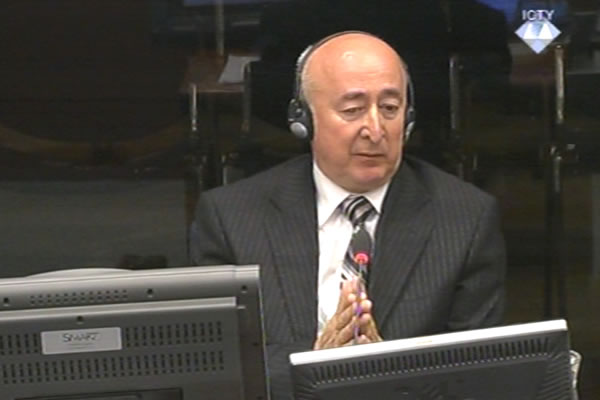Home
WITNESS WITH ‘CLEAR CONSCIENCE’ AND PROBLEMATIC PAST
Former commander of the VRS Birac Brigade Svetozar Andric says that his conscience is clear; the prosecutor tried to show that there was little justification for that. Andric ordered the evacuation of Muslims from Zvornik, the establishment of the Susica prison camp and the torching of the Vlasenica villages. Even as the prisoners from Srebrenica were being executed, Andric was appointed chief of staff in the Drina Corps
 Svetozar Andric, defence witness of Radovan Karadzic
Svetozar Andric, defence witness of Radovan Karadzic General Svetozar Andric agreed to Radovan Karadzic’s request to testify in his defense case only when Judge Kwon’s Trial Chamber issued a subpoena compelling him to appear as a witness. In his statement to the defense team, Andric tried to be kind to the accused, but his priority was to protect himself. For example, Andric tried to explain why he ordered the evacuation of Muslims from the Zvornik territory in late May 1992, saying that Muslims had wanted to leave. According to Andric, the Susica prison camp was established in a bid to treat the prisoners in line with the Geneva conventions.
The witness tried hard to appear relaxed during his testimony, claiming that his conscience was clear. Prosecutor Pack told him that there were many reasons why he shouldn’t feel that way. First, the prosecutor reminded Andric that on 13 July 1995 he was appointed the chief of staff in the Drina Corps. The areas where the people from Srebrenica were executed in those days were under the jurisdiction of the Drina Corps. Andric admitted that he was indeed appointed on that date, but insisted that he did not assume his duties until 8 August 1995. In a bid to explain why his signature appeared on the Drina corps documents drafted in the second half of July and early August 1995, the witness said that he had signed them ‘retroactively’.
While they were still on the topic of Srebrenica, the prosecutor put it to Andric that he had covered up the information about the mass executions. His position was that the OTP investigators should be told ‘as little as possible’. When the witness denied the suggestion, the prosecutor showed him a statement made by the Bratunac Brigade security chief Momir Nikolic. In his plea agreement, Nikolic said that in late 1999 and early 2000 Andric and other Bosnian Serb army officers had instructed him to say as ‘little as possible’ when he talked to the OTP investigators. The witness denied it, adding that in 1999 and 2000, he himself did not know anything about the executions. Consequently, he couldn’t ask others to cover them up, Andric explained.
The prosecutor then turned to the beginning of the war and Andric’s order of 28 May 1992. Andric ordered an ‘organized evacuation of Muslim women and children’ from Zvornik and the detention of men in prison camps ‘for the purpose of their exchange’. The witness clarified that his intent had been to prevent the ‘undisciplined behavior and uncontrolled capture of people’. When the prosecutor told him that after the order 4,000 to 5,000 Muslims were made to move out of Zvornik, Andric said that the Territorial Defense was responsible; they weren’t under his command. Confronted with the evidence about the many crimes against Muslims in and around Zvornik Andric explained that his brigade had been assigned an area of responsibility that should have been covered by a corps. ‘I would have had to be Napoleon’, he said, to know what was going on in every nook and cranny.
When he was confronted with the order of 31 May 1992 to establish the Susica prison camp in Vlasenica, Andric replied that the order pertained to the ‘organization’, not the ‘establishment’ of the prison camp. Andric claimed that he didn’t know anything about the torture of prisoners there. In fact, the witness gave the Trial Chamber his ‘word of honor’ that he had been unaware of the fact that 140 to 150 Muslim prisoners had been taken from the Susica prison camp on the eve of its closure and executed until he attended a meeting with Karadzic’s associates who talked about that. ‘They are here, they can confirm that I was surprised when they told me’, the witness said in his defense, pointing to the members of the defense team.
At the end of the cross-examination, the prosecutor brought up another document that shows, as she alleged, that Andric’s conscience couldn’t be clear. The document is Andric’s report from 1993 where he says that one of the villages near Vlasenica was ‘burned down, and tomorrow we also plan to do some torching’. The general, who has a wealth of experience, said that obviously an inexperienced non-commissioned officer or a soldier, ‘maybe even a woman’, wrote the report on his behalf. Andric said that the report should have noted that the village had been ‘destroyed’ and that the plan was to press on with the attack on the enemy artillery positions.
General Andric asked for and was granted ‘safe conduct’, a guarantee that he would not be arrested and extradited to Bosnia and Herzegovina as he traveled to The Hague and back to Serbia. Andric fears that in BH he could be ‘placed under a criminal investigation’ for the war crimes. After Andric completed his evidence, Karadzic called forensic medicine expert Dusan Dunjic.
Linked Reports
- Case : Karadzic
- 2013-07-19 HOW SREBRENICA OPERATION TURNED INTO A CRIME
- 2013-07-18 KARADZIC’S EXPERT WITNESS OFFERS ‘APPROXIMATE’ ANALYSIS
- 2013-07-17 EXPERT WITNESS DENIES CRIMES IN BH
- 2013-07-23 KARADZIC’S EXPERT PREPARED TO ACCEPT JUST 500 SREBRENICA VICTIMS
- 2013-07-24 PROSECUTION: WRONG CONCLUSIONS BASED ON SELECTIVE SOURCES
- 2013-07-25 FORCED TO ‘DISARM PEOPLE FORCIBLY’
